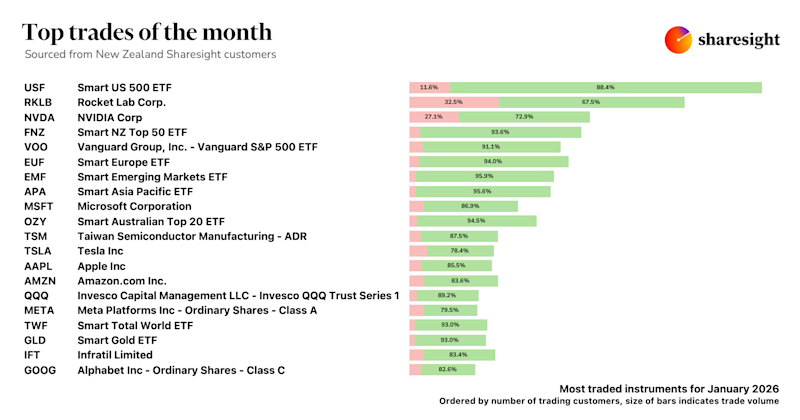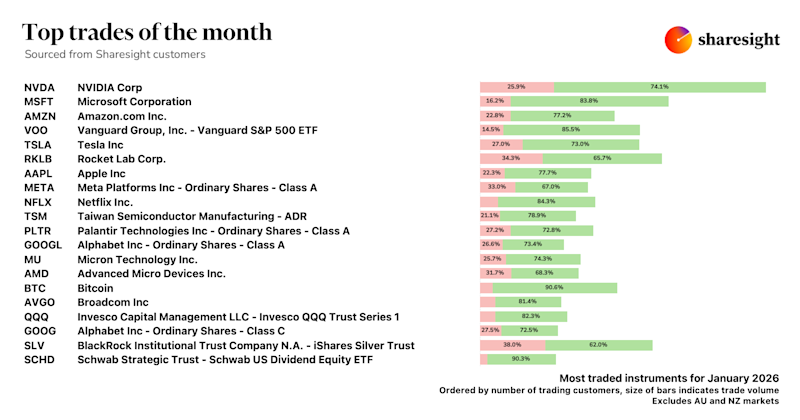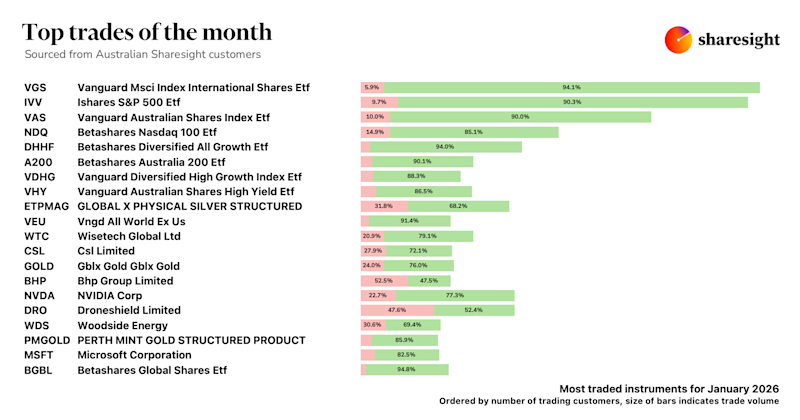Top 10 portfolio benchmarks used by US investors
Sharesight’s benchmarking feature helps investors track their success by allowing them to compare their portfolio performance to over 170,000 stocks, exchange-traded funds (ETFs) or mutual funds in the Sharesight database. This allows investors to zero in on their investment performance by benchmarking against an ETF that tracks a particular index, or a basket of stocks in an industry to get a like for like comparison for their own portfolio.
With so many options to choose from, we look at the top 10 portfolio benchmarks used by United States investors and how to add a benchmark to your Sharesight portfolio.

Top 10 portfolio benchmarks used by US investors in Sharesight
In choosing a benchmark, many investors use ETFs because they typically reflect the performance of a common index, without the costs involved in actually owning that basket of stocks. This gives investors a realistic indicator of how their portfolio would have performed had they bought into these stocks, without the effort of individually selecting and purchasing the stocks themselves.
Looking at the most common benchmarks used by Sharesight’s US users, SPDR S&P 500 (NYSE: SPY) is the most popular by far, which is not surprising as it tracks the performance of the 500 largest and most liquid companies in the US.

1. SPDR S&P 500 ETF (NYSE)
The SPDR S&P 500 ETF Trust (NYSE: SPY) aims to provide results corresponding to the performance of the S&P 500 Index. It is a leading index for large-cap US equities, capturing approximately 80% of available market capitalisation.
2. SPDR S&P 500 ETF (AMEX)
The SPDR S&P 500 ETF Trust (AMEX: SPY) is the same ETF product as mentioned above, listed on the AMEX. The AMEX is owned by the NYSE but operates independently, which means prices for SPY vary slightly between the exchanges, but typically converge over time.
3. Vanguard All-World ex-US ETF
The Vanguard FTSE All-World ex-US ETF (NYSE: VEU) seeks to track the return of the FTSE All-World ex-US Index, providing exposure to many of the world’s largest companies listed in major developed and emerging countries outside the US.
4. Invesco QQQ Trust
The Invesco QQQ Trust Series 1 (NASDAQ: QQQ) is designed to track the NASDAQ 100 Index, reflecting large-cap companies across sectors such as computer hardware and software, telecommunications, retail/wholesale trade and biotechnology.
5. iShares Europe ETF
The iShares Europe ETF (NYSE: IEV) aims to provide results corresponding to the performance of the S&P Europe 350 Index, which consists of leading blue-chip companies from developed European markets.
6. Vanguard S&P 500 ETF
The Vanguard S&P 500 ETF (NYSE: VOO) is designed to track the performance of the S&P 500 Index, which includes 500 of the largest US companies. The returns of VOO are essentially the same as SPY, however VOO has a slightly higher growth rate than SPY due to its lower expense ratio.
7. iShares MSCI ACWI ETF
The iShares MSCI ACWI ETF (NASDAQ: ACWI) seeks to track the results of an index composed of large and mid-cap equities in developed and emerging global markets.
8. Vanguard Real Estate ETF
The Vanguard Real Estate Index Fund ETF (NYSE: VNQ) aims to track the return of the MSCI US Investable Real Estate 25/50 Index. It invests in stocks issued by Real Estate Investment Trusts (REITs), companies that purchase office buildings, hotels and other real property.
9. Vanguard Total Stock Market ETF
The Vanguard Total Stock Market ETF (NYSE: VTI) seeks to track the performance of the CRSP US Total Market Index, which includes a diverse range of small-, mid- and large-cap equities.
10. iShares MSCI ACWI ex-US ETF
The iShares MSCI ACWI ex-US ETF (NASDAQ: ACWX) aims to track the results of an index composed of large- and mid-cap non-US equities.
How to benchmark a portfolio in Sharesight
To get started with benchmarking, all you need to do is access your Sharesight portfolio and click ‘Add a benchmark’ in the ‘Summary’ section.

Sharesight allows you to select from a drop-down list of the most commonly-used benchmarks, or alternatively you can search for any stock, ETF, or mutual fund Sharesight supports to use as a benchmark of your choice.

In the future, if you wish to change your benchmark simply click ‘Edit benchmark’, also located in the ‘Summary’ section.

Benchmark your portfolio today
Sharesight’s benchmarking feature is just one of the ways Sharesight helps you to stay on top of the performance of your investments. Benchmarking is available on Investor, Expert and Sharesight Pro plans. You can upgrade your plan to use this feature.
If you haven’t signed up for Sharesight yet, you can get started for free today.
FURTHER READING

Top trades by New Zealand Sharesight users — January 2026
Welcome to the January 2026 edition of our trading snapshot for New Zealand investors, where we look at the top 20 trades made by New Zealand Sharesight users.

Top trades by global Sharesight users — January 2026
Welcome to the January 2026 edition of Sharesight’s trading snapshot for global investors, where we look at the top 20 trades made by Sharesight users globally.

Top trades by Australian Sharesight users — January 2026
Welcome to the January 2026 edition of our trading snapshot for Australian investors, where we look at the top 20 trades made by Australian Sharesight users.